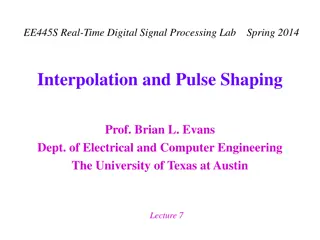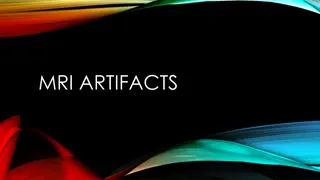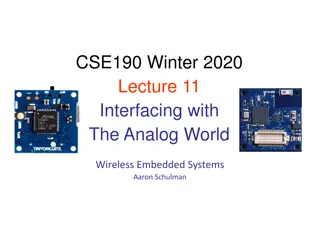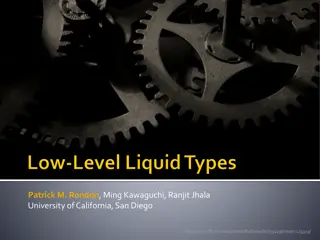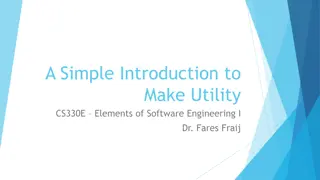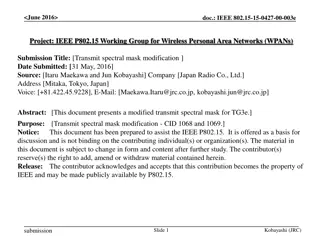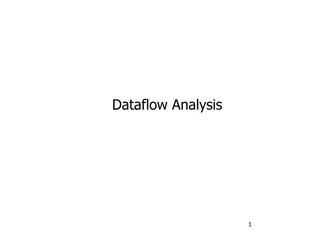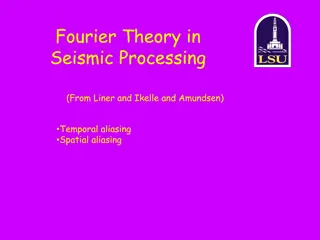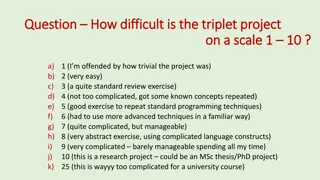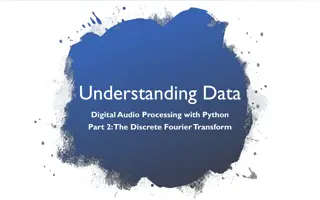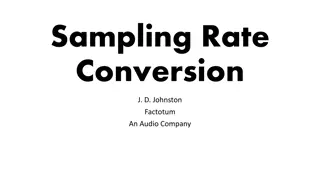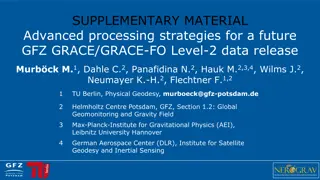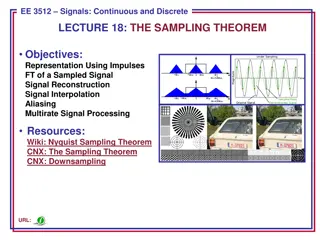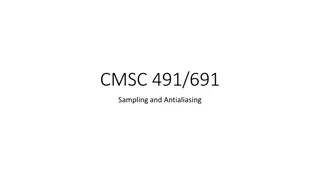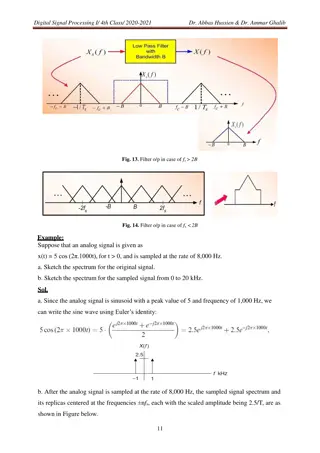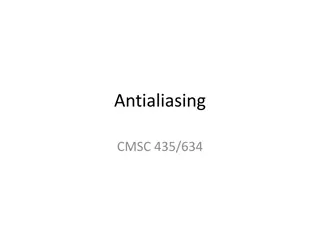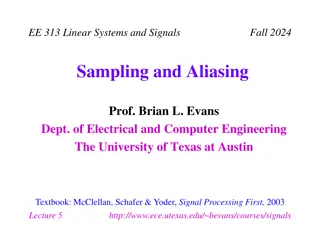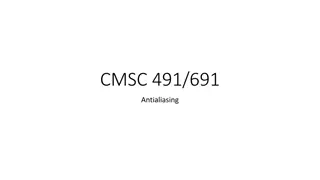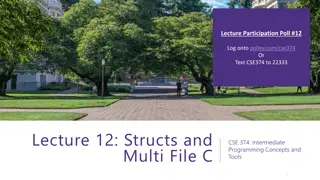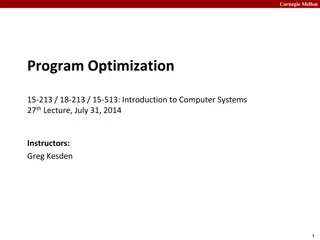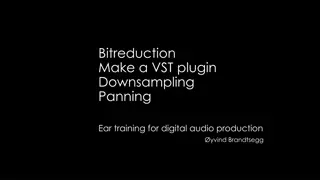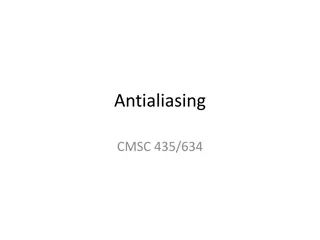Interpolation and Pulse Shaping in Real-Time Digital Signal Processing
Discrete-to-continuous conversion, interpolation, pulse shaping techniques, and data conversion in real-time digital signal processing are discussed in this content. Topics include types of pulse shapes, sampling, continuous signal approximation, interpolation methods, and data conversion processes
5 views • 14 slides
MRI Artifacts: Causes and Examples
MRI artifacts are signal misrepresentations that can be caused by various factors such as patient movement, magnetic field inhomogeneity, metallic objects, and under-sampling. Motion artifacts, magnetic susceptibility artifacts, and aliasing/wrap-around artifacts are common types of artifacts that c
2 views • 7 slides
Interfacing with Analog Signals in Embedded Systems
Exploring the conversion of analog signals from the physical world into electrical signals using transducers in embedded systems. Learn about going from analog to digital representation, choosing sample rates, the Shannon-Nyquist sampling theorem, importance of anti-aliasing filters, and the necessi
1 views • 18 slides
C Program Refinement Types with Liquid Types and Invariant Discovery
Discover the integration of Liquid Types and Refinement Types in C programming through Invariant Discovery, leading to automatically adapting C programs to fit Liquid Types. Explore challenges and solutions in expressing invariants, handling unknown aliasing, and implementing strong updates within t
0 views • 24 slides
Introduction to Make Utility and Makefile in Software Engineering
Make utility is an automation tool for efficient program running and compiling. It requires a Makefile to define tasks. Benefits include aliasing commands, efficient compilation of changed files, and ease of operation. Installation may vary per system. Makefiles consist of rules with specific struct
0 views • 28 slides
Modified Transmit Spectral Mask for IEEE P802.15 Working Group
This submission presents a modified transmit spectral mask for TG3e by Japan Radio Co., Ltd. The proposed mask aims to improve power efficiency without violating radio regulations. The motivation for the modification is to reduce unwanted aliasing and enhance SNR by employing a steep anti-aliasing s
0 views • 17 slides
Dataflow Analysis in Program Optimization
Dataflow analysis is crucial for optimizing programs by identifying opportunities for improvements like constant propagation and dead code elimination. This analysis involves modeling values of interest, formulating fixpoint equations, and solving them to enhance program efficiency. Concepts such as
1 views • 34 slides
Fourier Theory in Seismic Processing
Fourier theory plays a crucial role in seismic processing by helping to avoid temporal and spatial aliasing. It emphasizes the importance of sampling rates for accurate waveform reconstruction and highlights the significance of oversampling to prevent aliasing issues. Spatial aliasing is discussed i
1 views • 18 slides
Multirate Systems and Filter Banks in Software Defined Radio PhD Program
Dive into the world of multirate systems and filter banks in a Software Defined Radio PhD Program focused on electrical engineering. Explore topics like interpolation, decimation, time and frequency multiplexing, and more. Discover how filter banks split and combine input signals, and learn about th
0 views • 45 slides
Pixel Art
Pixel art is a unique form of digital art that harks back to the aesthetics of 8-bit and 16-bit computers and video game consoles. Created using software, pixel art involves editing images on a pixel level, often with a limited color palette. Techniques like dithering and anti-aliasing are common in
0 views • 5 slides
Project Difficulty Scales
Difficulty scale of a project is essential for effective planning and preparation. This involves assessing the complexity levels using a scale ranging from very easy to research project or thesis level. Understanding this scale helps in gauging the effort and resources required for successful projec
0 views • 20 slides
Digital Audio Processing with Python: The Discrete Fourier Transform
Aliasing occurs in digital audio processing when discrete sampled data leads to frequency ambiguity, losing information between samples. The Sampling Theorem states that a signal can be reconstructed from its samples taken at a rate provided that the signal contains frequencies less than the Nyquist
1 views • 24 slides
Sampling Rate Conversion: Understanding the Fundamentals
Sampling rate conversion, as explained in J.D. Johnston's Factotum at An Audio Company, is crucial to maintaining signal integrity while changing sampling rates. Key concepts include avoiding aliasing, preserving baseband signals, and understanding the impact of downsampling and upsampling technique
0 views • 72 slides
Overview of Pulse Modulation Techniques
The world of Pulse Modulation with a focus on Sampling theorem, Reconstruction theorem, Aliasing, and various Pulse Modulation Schemes like PAM, PWM, and PPM. Learn about Multiplexing Techniques such as FDM and TDM through informative visuals and explanations.
0 views • 34 slides
Advanced Processing Strategies for Future GFZ-GRACE/GRACE-FO Data
This supplementary material discusses advanced processing strategies for the upcoming release of GFZ-GRACE/GRACE-FO Level-2 data, focusing on improving background models, stochastic modeling of ocean tide and non-tidal atmospheric and oceanic de-aliasing, sensor data analysis, and processing strateg
0 views • 12 slides
Sampling Theorem in Signal Processing: Representation and Reconstruction
Learn about the Sampling Theorem in signal processing, which explains how bandlimited continuous-time signals can be represented as discrete-time signals without losing information. Understand signal reconstruction, interpolation, aliasing, and multirate signal processing concepts. Explore the Fouri
0 views • 13 slides
Advanced Concepts in Sampling, Antialiasing, and Signal Processing
Explore the realms of sampling, antialiasing, Fourier transforms, convolution, filtering, aliasing, and more in the field of signal processing with detailed descriptions and images.
0 views • 38 slides
Understanding Spectrum Analysis and Signal Reconstruction in Digital Signal Processing
Explore the concepts of spectrum analysis, signal sampling, aliasing, and signal reconstruction in digital signal processing. Learn about the Nyquist theorem, lowpass filters, and handling spectral distortion. Ideal for students and enthusiasts of signal processing.
0 views • 4 slides
Understanding Aliasing and Antialiasing in Computer Graphics
Discover the visual artifacts of aliasing such as jagged lines, missed details, and strobing, and learn ways to fix aliasing through antialiasing techniques. Dive into sampling theory to understand signal reconstruction based on Shannon's theory.
0 views • 33 slides
Linear Systems and Signals Fall 2024: Sampling and Reconstruction Lecture
Explore the fundamentals of signal processing in EE 313 with Prof. Brian L. Evans at The University of Texas at Austin. Learn about sampling, aliasing, reconstruction, and the Sampling Theorem using examples and illustrations from the course lectures.
0 views • 17 slides
Understanding Signal Sampling and the Sampling Theorem
Explore the concepts of signal sampling, the Sampling Theorem, and spectral duplication in signal processing. Learn about Nyquist Theorem and the implications of aliasing in this comprehensive study.
0 views • 47 slides
Understanding and Resolving Aliasing Issues in Digital Imaging
Explore the impact of aliasing on digital images, including visual artifacts like jagged lines and missed details. Learn how antialiasing techniques can help address these issues, along with insights into sampling theory and reconstruction limitations. Discover practical strategies for fixing aliasi
0 views • 34 slides
Understanding Antialiasing in Computer Graphics
Explore the concepts of antialiasing and aliasing artifacts in computer graphics, including common techniques used in games such as SSAA, MSAA, MLAA, FXAA, and TAA. Discover how these methods blur high-frequency artifacts to enhance image quality and reduce aliasing effects caused by sampling. Dive
0 views • 15 slides
Real-Time Digital Signal Processing Lab Spring 2025: Sampling and Aliasing
Explore the concepts of sampling, aliasing, and reconstruction in real-time digital signal processing. Learn about sampling theorems, frequency domain views, and the implications of aliasing on signal reconstruction. Discover techniques such as sample-and-hold reconstruction and ideal lowpass filter
0 views • 16 slides
Intermediate Programming Concepts and Tools: Structs, Typedef, Type Casting, Pointer Casting
Explore intermediate programming concepts in C language including structs, typedef, type casting, and pointer casting. Learn about data types in C, type aliasing with typedef, converting between types, and managing pointers effectively. Dive into the world of C programming with practical examples an
0 views • 21 slides
Advanced Techniques for Implementing Shadows in Game Graphics
Learn about Punctual Shadow Algorithms, Shadow Volumes, Shadow Rays, Shadow Maps, Shadow Acne & Shadow Bias, Shadow Resolution, and Shadow Aliasing. Explore different methods and challenges to enhance shadows in game graphics.
0 views • 12 slides
Understanding Optimization in Computer Systems at Carnegie Mellon
Explore the world of computer system optimization at Carnegie Mellon University, covering topics such as code motion, procedure calls, memory aliasing, and optimizing compilers. Learn about the complexities and limitations of optimizing compilers and the importance of constant factors in program per
0 views • 55 slides
Mastering Bit Reduction, Resampling, and Upsampling in Digital Audio Production
Dive into the world of digital audio production with a focus on bit reduction, resampling, and upsampling techniques. Learn about VST plugins, panning, and ear training for optimal sound processing. Explore the nuances of sampling analog sound waves, mastering digital sound resolutions, and understa
0 views • 9 slides
GAMS Sets and Data Assignment Examples
Learn about simple sets, multiple names for a set, aliasing sets, multi-dimensional sets, assigning data for higher dimensions, and working with tables in GAMS. Explore logical and numerical relationship operators for advanced modeling.
0 views • 31 slides
Understanding Aliasing and Antialiasing Techniques in Image Processing
Explore the concepts of aliasing and antialiasing in image processing, learn about the visual artifacts caused by aliasing, and discover techniques to reduce or eliminate these issues. Sampling theory, jagged lines, missed detail, and strobing effects are discussed to help you understand and address
0 views • 33 slides
